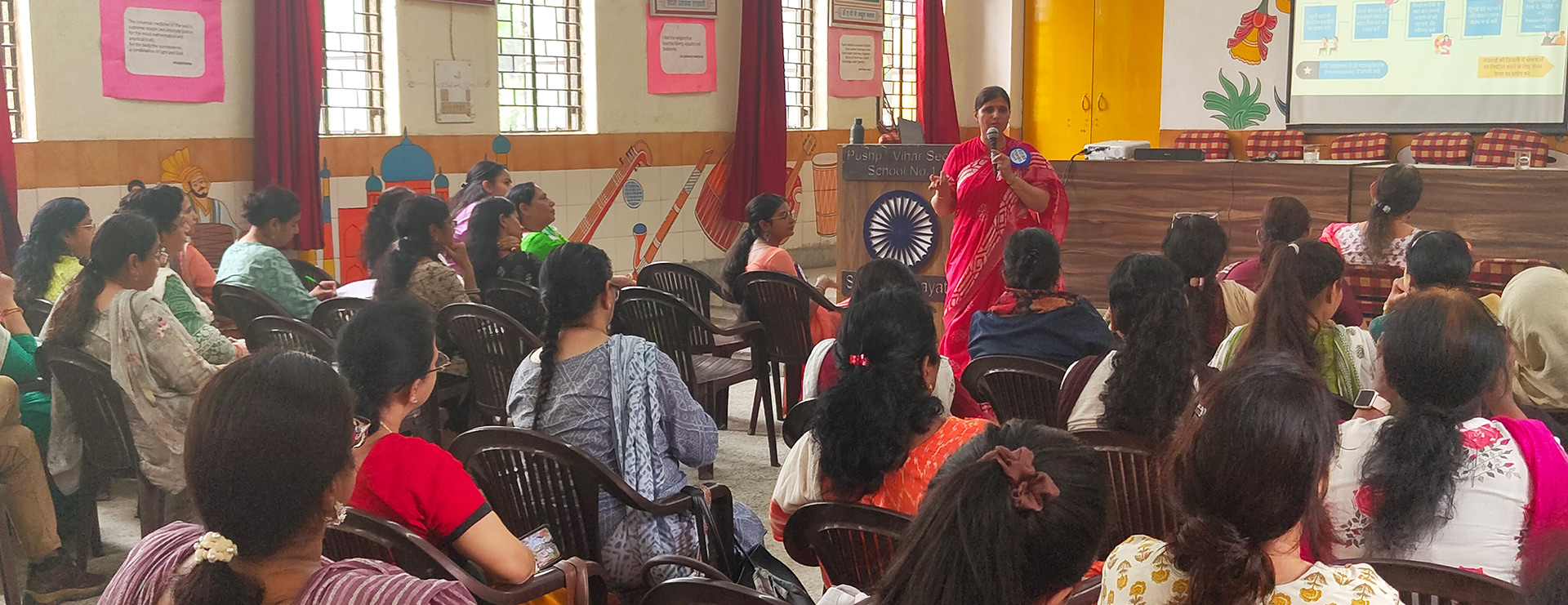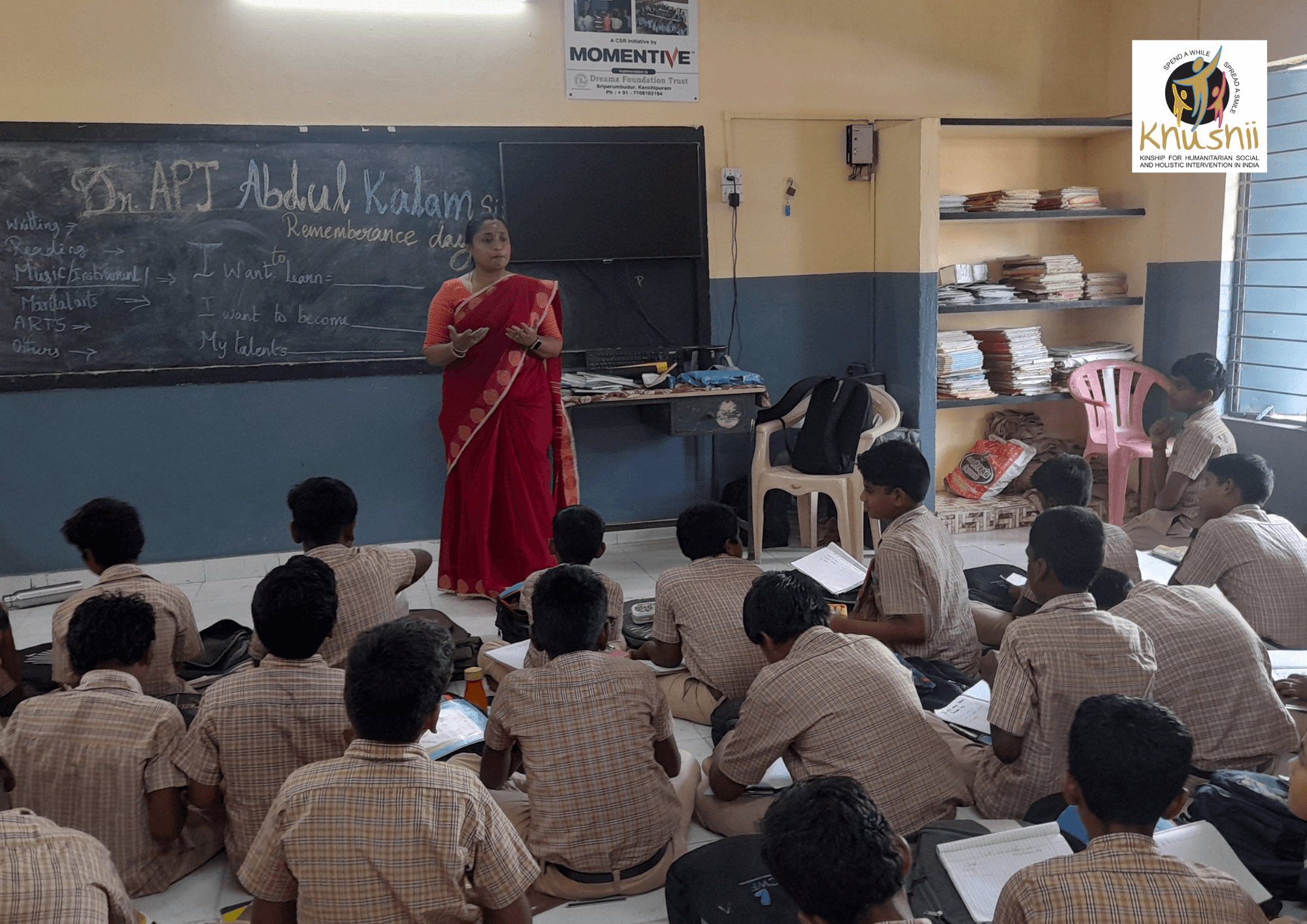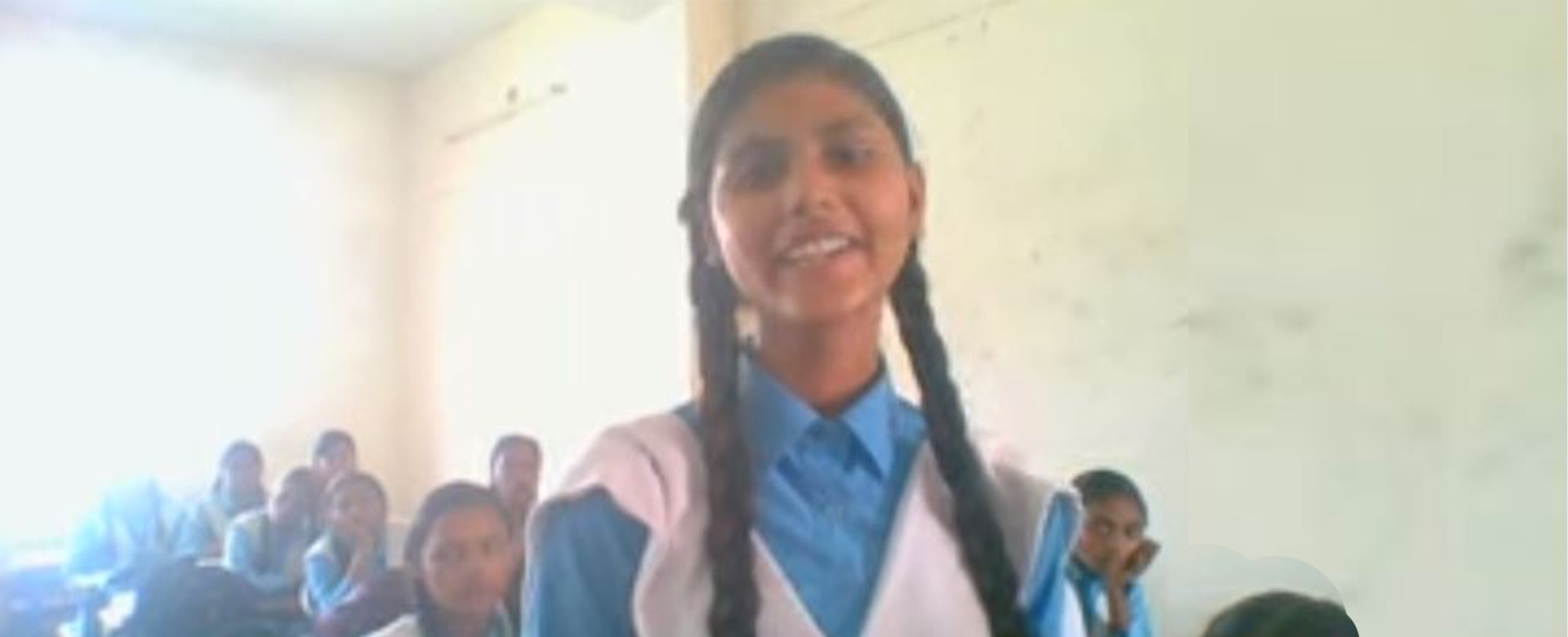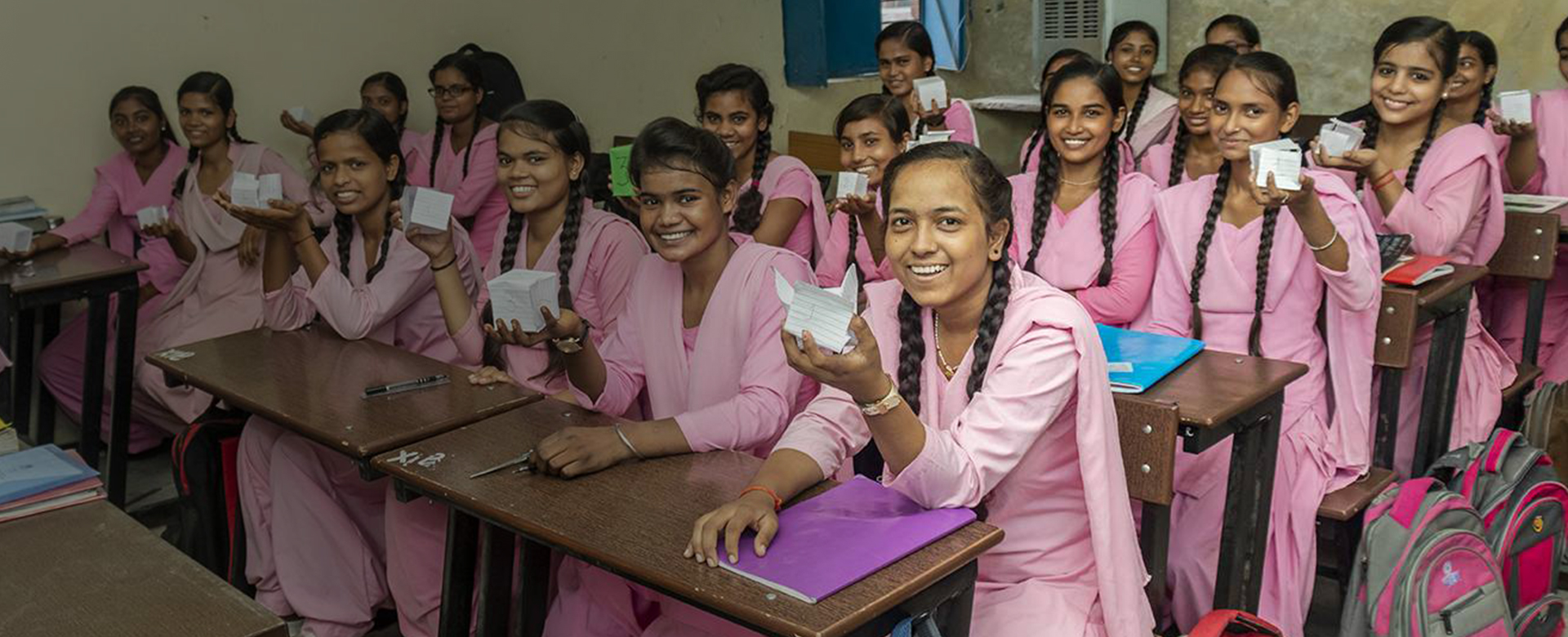Sensitive Teacher, Successful Student: A Look at Khushii’s ‘Manobal’
As a social media & digital content intern at KHUSHII, I recently had the opportunity to attend a teacher training session under the flagship programme Manobal. Before attending the session, I had read about the programme itself, and my interest was piqued as the approach was not only innovative but also grounded in reality. Manobal aims to psycho-educate 2,000 government school teachers and raise awareness about their own mental health as well as their students’. My assignment – recording videos, photos, and testimonials from participants – left me with a familiar mix of excitement and nervousness. I was excited to understand first-hand the lived experiences of KHUSHII’s beneficiaries – the main reason I joined this NGO.
On arriving at the venue, I was eagerly waiting for the event to start, because mental health is a topic that means a lot to me on a personal level. But I am also aware of its limitations in our contemporary times. Seventy per cent of children in India are enrolled in government schools (ASER survey, 2021), with most of them coming from underprivileged backgrounds and to a large extent, a person’s material condition determines their psychological condition. Sure, money can’t buy happiness, but it can buy therapy sessions, psychiatric treatment and medicines for mental illness. Money can also buy basic necessities – a clean home in a safe neighbourhood, nutritious meals and comfortable clothes – the absence of which leads to a higher risk of depression and anxiety. Add onto this the stigma and myths that envelope mental health in India, and one begins to understand why only 1 in 20 Indians with mental health concerns receive any treatment (Sagar et al., 2017). After all, how can we expect a construction worker or even an overworked government school teacher to have any time, energy, or awareness to tend to their mental health? And if teachers cannot take care of their own mental health, how can they take care of children?
Further, teachers have a multifaceted role that goes beyond just teaching – they must also be listeners, conflict resolvers, cleaners, librarians, doctors; on and on goes the list. Long hours, high stress levels, and burnout negatively impacts their mental health. One’s own mental state determines how we interact with others; you may recall a time you were stressed about an issue at home, and ended up taking it out on an entirely unrelated person. Thus, it is crucial to equip teachers with the necessary tools and skills to deal with their emotions in a healthy way. Emotionally regulated teachers are the only teachers that can create a safe space for their students to discover their true selves (rather than believing they must put on a mask to be loved), recognise their own individual interests, be driven by curiosity rather than fear, ask challenging questions, and most importantly, have an unwavering belief in their own worth. For example, a teacher that enters the class with a smile, doesn’t punish students for making honest mistakes, and appreciates them for little achievements is bound to make children feel motivated to do better in their classes and take a genuine interest in education. Ultimately, a good education paves the way for financially independent adults and informed citizens, who contribute to a better life for themselves and society at large. In short, teachers, not students, are the main beneficiaries of Manobal, because the benefits experienced by teachers are bound to seamlessly flow to their students..
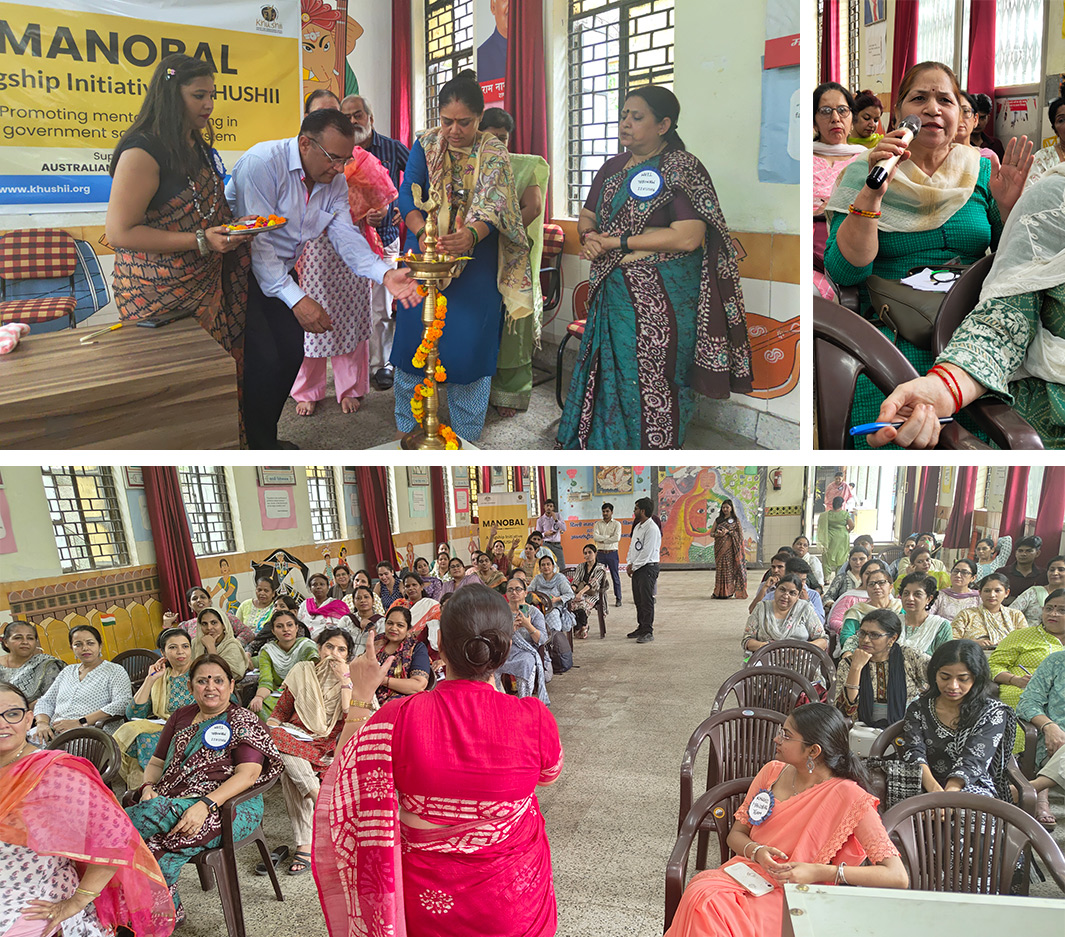
Students spend 6+ hours a day with teachers (often more than parents). Thus teachers equipped with the required skills can play a revolutionary role in bridging the alarming treatment gap in India, especially among the youth. If the parents are hesitant towards seeking professional help for their child, the teacher can refer the child to a psychologist and convince parents about its benefits, thus effectively transforming the child’s life for the better. The teacher can be the trusted adult a child turns to for consistent support.
In such a scenario, Manobal’s efforts at raising mental health awareness among government school teachers and equipping them with tools & skills to deal with their emotions, is a small but significant step. The session began with a short guided meditation. Mindfulness has fascinated me for several years, because in our fast-paced capitalistic world, meditation is one space where our only job is to simply exist. Silence and stillness work their magic on us, making us aware of our thoughts and attributes that we didn’t even know existed.
Next, the counsellors discussed coping strategies. I was struck by how so many of us resort to distraction, suppression or simply lashing out to deal with unpleasant emotions. “This shouldn’t make me sad/angry/scared,” “I should just be happy,” we tell ourselves. A big reason for our lack of healthy coping strategies is that we are unable to do the very first step: knowing what we feel. I recall my emotional state when I first arrived at the event – that confusing blend of excitement, nervousness, and other feelings that I could not even name. I remember I also felt a small fear of these uncomfortable feelings, which made me want to ignore their existence. It seems our Indian languages lack words to describe mental health related concepts (in a respectful or neutral way). I do not know any commonly-used Hindi translations of, say ‘depression’ or ‘burnout’, which are increasing in usage nowadays. This gives people the false impression that mental health issues are foreign concepts, or that they did not exist in the so-called ‘simpler times’ of the past.
There was one exercise that beautifully demonstrated the power of self-reflection in real time: teachers were first asked to list the expectations they have from their students. A list of over 10 qualities emerged, including things like ‘being hygienic,’ ‘sitting in one place,’ ‘being obedient,’ ‘listening without getting distracted’ – qualities which are oftentimes at odds with children’s still developing brains and true natures. Only one or two participants said that they expected their students to be happy and smiling. I found my heart sinking as I thought of how children are burdened with so many responsibilities, and only when they carry them out are they deemed worthy and good. But I was lifted out of my disappointment when the next question was posed: “Teachers, how many of these qualities do you possess?” Suddenly, there was a shy smile on everyone’s face. No preaching, no external instruction, no explicit statement was required to begin a shift in teachers’ expectations from their students – a simple question and some self-reflection had done the trick.
The fact of the matter is that children’s brains are physically different from adults. For example, children have a smaller prefrontal cortex (the part of the brain that controls rational thinking) than adults, and so they might rely more on their amygdala (associated with emotions, impulses, aggression). Their biochemistry is also wired to need adults, to help them understand their emotions and deal with them in a healthy manner. “Even brief exposure to stressful experiences (such as adverse or deprived caregiving) early in life can have life-long impact on brain development and socioemotional functioning.” For example, if a child lived with an unstable caregiver who could shout at them at any time, they might grow up to be a hypervigilant adult who puts others’ needs before their own to ‘keep the peace’. Thus, it is of utmost importance that teachers not only become aware of children’s mental health, but also their own. After all, if the teacher does not feel equipped to take care of their own well-being and have compassion towards their own self, how can they extend the same kind of care to their students?
About the Author:
Lavanya Senthil,
Communication Intern at KHUSHII
References:
1 In 2022, more than 13 million children in India aged 10 to 14 years lived in extreme poverty (Rathore, 2023)
2 According to a study at MIT, those with the lowest incomes are typically 1.5 to 3 times more likely than the rich to experience depression or anxiety. https://economics.mit.edu/sites/default/files/2022-09/poverty-depression-anxiety-science.pdf
3 The treatment gap for people with mental health concerns in India is estimated to be
approximately 95%, with only 1 in 20 receiving any treatment (Sagar et al., 2017).
4 https://raisingchildren.net.au/pre-teens/development/understanding-your-pre-teen/brain-development-teens#:~:text=Because%20the%20prefrontal%20cortex%20is,impulses%2C%20aggression%20and%20instinctive%20behaviour.
5 https://www.pnas.org/doi/full/10.1073/pnas.1307893110
6 How to Be the Love You Seek by Nicole LePera

